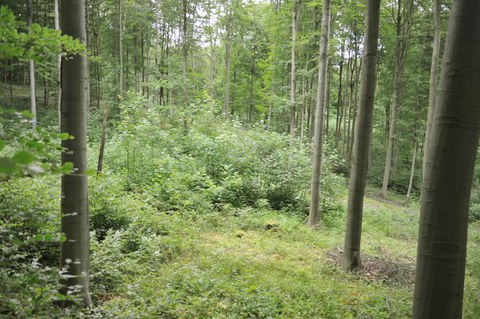Oct 28, 2025
New research project approved on the future of the copper beech
Forest in transition: The future of the copper beech under drought stress
The Eva Mayr-Stihl Foundation is funding a new joint project at the Faculty of Environmental Sciences at TU Dresden from 2026-2029 entitled Forest in Transition: The Future of European Beech under Drought Stress. The interdisciplinary research project, in which five Chairs of the Forest Sciences and two Chairs of the Geosciences will work together, will receive a total of €1.6 million in funding.
Climate change with increasing droughts requires measures to strengthen the resilience of our forests. This applies in particular to the copper beech, Germany's most important deciduous tree species, which will suffer even more from drought in the future than previously assumed. Significant damage can already be observed in older beech stands in particular. Thinning in a targeted manner to reduce competition for water could be one way of increasing the vitality of individual trees. However, there is little and sometimes contradictory information on this. The project uses a novel combination of cross-scale monitoring approaches to link data on canopy water status, water transport, soil water availability and root activity of differently thinned beech stands. Remote sensing approaches allow predictions on transpiration, vitality and carbon storage from the individual tree to the landscape level. The project builds in a targeted manner on ongoing research work and research results of the forest sciences in Tharandt. The research will be carried out on existing experimental areas in the Dübener Heide (near-natural beech forest) and in 6 other Saxon beech forests where thinning has already taken place in a targeted manner. The aim of the project is to quantify the effects of different thinning on water supply, biomass development, vitality and carbon storage of old beech trees. This should lay the scientific foundations for the development of silvicultural strategies for the establishment of mixed beech forests that are resilient to climate change.
The project cooperates closely with the newly established junior research group "Forest-related environmental communication" (also funded by the Eva Mayr-Stihl Foundation) in order to combine scientific findings with target group-oriented public relations work and practical communication in a pilot project. Excursions and on-site demonstrations are planned on the project's experimental plots with stakeholders from forest administrations, forestry companies, district nature conservation authorities and other local associations.
Further information in the official press release of TU Dresden.

